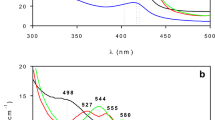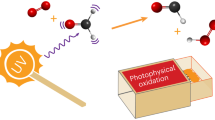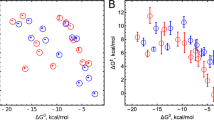Abstract
WE have recently suggested1 that the decomposition of hydrogen peroxide by catalase is brought about by the successive reduction of the catalase iron by the peroxide and its re-oxidation by molecular oxygen; the reaction proceeding according to the following equations:
This is a preview of subscription content, access via your institution
Access options
Subscribe to this journal
Receive 51 print issues and online access
$199.00 per year
only $3.90 per issue
Buy this article
- Purchase on Springer Link
- Instant access to full article PDF
Prices may be subject to local taxes which are calculated during checkout
Similar content being viewed by others
References
Keilin, D., and Hartree, E. F., Proc. Roy. Soc., B, 124, 397 (1938).
Keilin, D., and Hartree, E. F., Proc. Roy. Soc., B, 121, 173 (1936).
Johnson, F. H., and van Sehonvenburg, NATURE, 144, 634, (1939).
Author information
Authors and Affiliations
Rights and permissions
About this article
Cite this article
KEILIN, D., HARTREE, E. Mechanism of Decomposition of Hydrogen Peroxide by Catalase. Nature 144, 787–788 (1939). https://doi.org/10.1038/144787b0
Issue Date:
DOI: https://doi.org/10.1038/144787b0
This article is cited by
-
Decomposition of Hydrogen Peroxide by Catalase
Nature (1943)
-
Decomposition of Hydrogen Peroxide by Catalase
Nature (1939)
-
Decomposition of Hydrogen Peroxide by Catalase
Nature (1939)
Comments
By submitting a comment you agree to abide by our Terms and Community Guidelines. If you find something abusive or that does not comply with our terms or guidelines please flag it as inappropriate.



